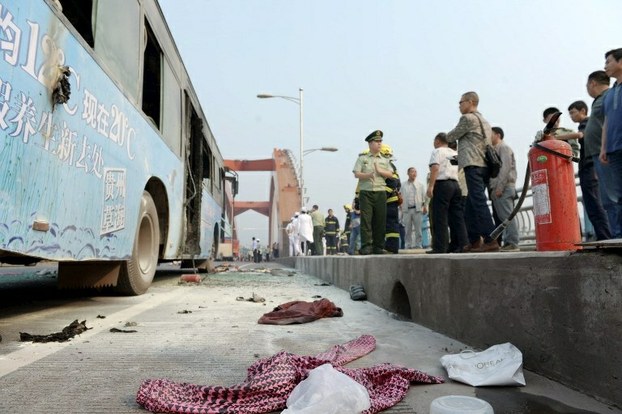




A man set fire to a passenger bus in the southwestern Chinese province of Sichuan and died in an arson attack that left 77 people hospitalized, nine of them in critical condition, official media reported on Tuesday.
Official media said that the man, identified as Yu Yuehai, 51, was a former middle school teacher and that the motive for the arson was still under investigation.
Analysts said the incident underscored rising social tensions in the world's most populous nation.
Yu set fire to the bus, which was carrying dozens of passengers, at the start of the afternoon rush hour in Sichuan's Yibin city on Monday, the municipal authorities said in a statement.
The fire began at around 4:50 p.m. on Nanmen Bridge, official media quoted passengers as saying.
'Total chaos'
"I suddenly heard a huge bang, so I went out to take a look," a food business owner on Nanmen Bridge told RFA on Tuesday. "I was shocked to see flames pouring out of a bus on the bridge."
"When I went up there, there were passengers who had escaped from the blaze lying by the side of the road," he said. "It was total chaos."
He said many of those at the scene were still on fire. The flames were extinguished and they were taken to hospital for their burns to be treated, he said.
"The police have cordoned off the whole area, and most people can't get anywhere near it," he said.
Under investigation
A total of 77 people were sent to the hospital, three of whom were seriously injured, and nine of whom were in critical condition, the official Xinhua news agency reported.
An employee who answered the phone at the Yibing No. 3 People's Hospital said some of the injured were being treated there.
"We have already sent people to treat them," the employee said. "But please can you call [the government] and ask them."
An official who answered the phone at the press office of the Yibing police department said there were no further details available on Tuesday.
"This is still under investigation," the official said. But he confirmed that the man who died appeared to be the person who set fire to the bus. "That's right," he said.
Around 50 passengers were on the bus and most of them escaped through the front door, Xinhua quoted a 12-year-old passenger as saying.
The authorities are now probing the motivation behind Yu's alleged attack, it said.
Lingering fears
An Yibing resident surnamed Luo said there was little evidence of the incident on Nanmen Bridge by Tuesday afternoon.
"It looks like it usually does now; I saw it," she said. "But I noticed that there aren't so many people taking buses today."
"And when you do take the bus, everyone is talking about what happened."
She said people were frightened of further attacks. "Some of these terrorists have personally motives and will take out their mood on the general public," Luo said.
"I think it's terrifying, because you can never really know what another person is thinking, so I'm afraid when I'm in a public place."
Social tensions
Activists have described a series of blasts in public places in China in recent months as symptomatic of deep social tensions and injustice that have no immediate solution.
Last month, authorities in the northern city of Taiyuan executed a man after finding him guilty of setting off several deadly blasts near a provincial ruling Chinese Communist Party headquarters last November that killed at least one person.
Last October, authorities in Beijing handed down a six-year jail term to a disabled man who set off an explosion at the city's international airport, sparking anger over what many said was an unjust sentence.
Sichuan-based rights activist Pu Fei said incidents like the Yibing bus fire are becoming more and more widespread in China.
"They are rooted in the fact that there is too much pressure on people in China, regardless of their socioeconomic level," Pu said.
"This sort of incident is only going to happen more and more, not less and less, because there is no outlet for [this pressure]."
He said outlets for complaint in certain areas had been "entirely closed off" by the ruling Chinese Communist Party.
"It is becoming harder and harder to be successful, whether in official jobs or commercial ones," Pu said. "And anyone with connections or a powerful family can openly bribe their way with money and even sex to get the success that eludes most ordinary people."
The target of nearly a dozen "terrorist" attacks in the past year, China is facing the consequences of decades of growing social inequality and hard-line suppression of government critics, analysts say.
China has seen 10 "terrorist incidents" in the past year that killed more than 30 people, including police officers, the official news agency Xinhua said, reporting on an official "blue paper" on terrorism released last week.
Reported by Lin Jing for RFA's Cantonese Service and by Yang Fan for the Mandarin Service. Translated and written in English by Luisetta Mudie.